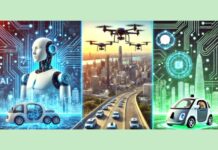Artificial intelligence (AI) is revolutionizing the educational landscape, and traditional classrooms are no longer confined to standardized approaches. Instead of one-size-fits-all instruction, AI enables personalized learning experiences. By tailoring content to individual students’ needs, AI fosters deeper understanding and ignites a passion for knowledge acquisition.
The Advent of AI in Education: A Paradigm Shift
The introduction of educational technology (EdTech) represented a substantial divergence from traditional educational techniques. It offered digital materials and interactive learning technologies, implying a more engaging educational environment. Furthermore, the arrival of computers, internet access, and a plethora of digital platforms demonstrated the technological promise in the field of education.
Impact of AI in Learning
Conventional educational approaches, when integrated with artificial intelligence, give several benefits to the learning system. Here’s a look at some of them:
Personalised Experiences
One of the most significant effects of AI on education is its capacity to personalise learning experiences. AI-powered personalised learning adjusts to each student’s pace, preferences, and skills. AI uses advanced algorithms to analyse data collected from students’ interactions with instructional content, determining strengths, shortcomings, and learning patterns. This information is then used to construct an individualised curriculum, ensuring that students receive materials that are appropriate for their unique learning styles.
Student Engagement
While catering to customised learning styles, AI-powered systems have improved engagement among students. Interactive learning systems provide dynamic material such as movies, simulations, and adaptive quizzes to catch and maintain students’ attention. This involvement dramatically improves retention and understanding, which leads to higher academic achievement. Following this benefit, Global Market Insights has predicted in its report that the market size of AI in education will reach $20 billion by 2027.
Additionally, artificial intelligence systems can identify areas where students struggle and offer tailored assistance. AI, whether through additional practice tasks, different teaching approaches, or supplemental materials, helps to solve learning gaps easily, ensuring that students have the assistance they require to succeed.
Empowering Teachers
Artificial intelligence does not just assist students; it also provides instructors with useful tools for optimising instructional methods. Teachers can utilise AI-generated insights to emphasise individual student success, allowing them to modify their teaching tactics accordingly. Likewise, AI helps to automate administrative processes, allowing educators to devote more time to offering personalised assistance and mentorship to their children.
The Future Classroom
As AI advances in the education industry, the classroom of tomorrow is envisioned as a dynamic, technologically integrated environment. Traditional lectures may give way to interactive sessions in which AI-powered platforms stimulate debates, analyse real-time replies, and tailor information to students’ understanding levels. Virtual reality (VR) and augmented reality (AR) can transport students to historical events, scientific phenomena, or remote locales, providing immersive learning possibilities.
In addition, the inclusion of AI-powered chatbots can provide students with rapid assistance by answering questions, explaining concepts, and leading them through courses even outside of typical classroom hours. These virtual assistants can act as personalised tutors, available around the clock to help students in their learning journeys.
While technology advances, cooperation among educators, policymakers, and technologists becomes more important in realising the full potential of AI to provide an inclusive, engaging, and effective learning environment for every individual. As people discover this technological frontier, the ethical and social deployment of AI in education should remain a top priority, ensuring that the advantages of personalised learning are available to all, paving the path for a more empowered, educated, and talented future generation.

















